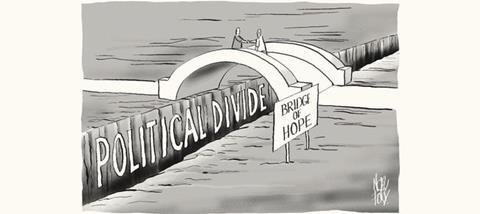
Staying at a hotel in Jerusalem, we were 120 wide-eyed pilgrims, keen to not only see the biblical sites but to also wrestle with the complex issues that make the Holy Land a cauldron of turmoil. I’m not terribly impacted by revered locations but I enjoy the rustic beauty of Galilee, as well as standing on the worn steps of the temple near where Jesus turned the tables. The ancient ruins of Capernaum are another favourite, even if a monstrous building has been built over the remains of what is thought to be Peter’s house, which seems rather rude.
We had heard impassioned presentations from Jewish tour guides, insisting that in a post-Holocaust world the land was surely theirs. We visited Bethlehem, now encircled by a wall twice the size of the one that once spliced Berlin, and heard from Palestinian Christians who feel forgotten by the wider world.
And then came the invitation extended to Gary, one of our group. A security specialist, he is more aware than most of the dangers of unfamiliar territory. But he and a Palestinian member of the hotel staff had struck up a conversation about football. The waiter proffered an offer: would Gary and a couple of friends like to come to his home to watch the game that evening?
Responding was not without risk for either party. For all they knew, Gary and his mates could have been walking into a trap. The Palestinian ran the risk of being seen fraternising with those outside of their community. But the evening spent watching the beautiful game together turned out wonderfully. Gary and his friends were treated as guests of honour. A cake had been baked and trust had been celebrated as people forgot nationality and ethnicity, and settled down to just be members of the human family together.
In sharing this story, my intention is not to comment on the political situation in the Holy Land, so please don’t write in. It’s just heart-warming to hear of people taking risks to connect across perceived divides.
And then just this week I heard about another wondrous invitation. Hugh was raised in a loving but staunch unionist family in Ulster. Enmity can blossom early; he recalls dodging stones hurled by Catholic kids as he walked to school in the morning. His response was to make regular hitand-run skirmishes up Seaforde Street, a republican stronghold and flashpoint marooned in the middle of Protestant East Belfast, smashing the windows of those he viewed as enemies. On that street was a chapel where IRA snipers crouched.
But then, years later, as an adult now and a pastor, Hugh had been invited to participate in a funeral at that very same chapel. Wondering if anyone might recognise him from his younger, window-smashing days, he attended, and was then asked to be a pall-bearer to carry the coffin containing someone’s Catholic son. So he obliged. As he walked, ever so slowly, in contrast to his window-smashing sprinting from years gone by, he realised how much his own heart had changed over the decades.
The point of these two stories? There is none, except that I offer them as a tiny trickle against the flood of bad news that so often dominates the headlines. As we have rightly wept over atrocities on our TV screens, our response might not just be one of compassion, solidarity and prayer, but of fear and even despair.
But in the midst of the darkness, there is light, and around the world today, not only will kingdom people be quietly making a difference, but human beings of all faiths and none will be kind, respectful and generous, taking faltering, risky steps of love.
And that is surely enough to make these stories worth telling.
Jeff Lucas is teaching pastor at Timberline Church, Colorado. He is an international speaker, author and broadcaster Follow Jeff @jeffreylucas


























